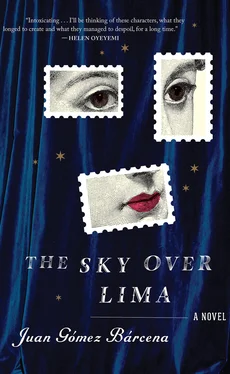If you wish to know my soul, you should not look at that house. Nor at the geometric avenues, rigid like the instructions of a strict tutor. I am not myself in my house. Only far from it — far, too, from the heart of that city where gentlemen in top hats and women in their street gowns promenade. In my walks, I seek a different, unknown Lima. Because to keep painting this canvas, you must know, my dear Juan Ramón, that there at the edges the strict grid becomes chaotic, twisted, full of unpredictable sinuosities and bends and leaps. I love to wander through those poor neighborhoods, down those dirt alleys where no one has to pretend to be anything. Where the people shout out with unpretentious, authentic words and you can stop to watch a sunset or a flower growing in the crevices without being bothered. My soul more closely resembles those little dead-end streets, those picturesque lots, and I return home with the hems of my skirts soiled with dust and the satisfaction of having lived something real, something beautiful…
Oh dear, what strange secrets I am confessing to you, my friend!
◊
The Professor has liked the last few letters. “This is something else,” he says, “now your cousin is really letting herself go, showing her face a bit.” He also praises the delicate handwriting once again, and when he does, Carlos lowers his eyes.
“So… you think there’s a chance?”
“Of what?”
“Of making her fall in love.”
“Making her fall in love? Who?”
“Making him fall in love, I mean. You know, Juan Ramón. The Spanish poet.”
“Oh! Well… who knows? But one thing’s for sure: the beguiling eye of this covered lady has been unveiled! No doubt about that!”
Carlos goes to ask for his advice every week, whenever Georgina receives a letter or is getting ready to write one. I’ve never met such a solicitous cousin before, the Professor says every time he sees Carlos join the queue. He always comes alone, but Cristóbal doesn’t mention José’s absence. He seems to remember him only one morning when he insists on rewriting a particular passage of the next letter and Carlos refuses.
“You see, she wants to write it without anybody’s help,” he insists.
“But she’s not making you come all the way out here every week for no reason.”
“Well… actually, Georgina doesn’t know I come to see you.”
Cristóbal raises his eyebrows.
“Oh! So she doesn’t know I exist?”
“No.”
“And if she doesn’t know, how do you transmit the wisdom gained from our chats?”
“Well… I pretend it’s my idea, you know? I ask her, she shows me the poet’s most recent letter or one of her numerous drafts, I gently offer an opinion… When she listens to me, the look in her eyes…”
He stops himself.
“Go on, say it, say it. The look in your cousin’s eyes. You know, we’ve talked so much about her and I still don’t know even know what color her eyes are. I’m curious. What is this cousin of yours like? And don’t tell me she’s beautiful and shapely; that’s old news.”
Carlos accepts the cigarette the Professor offers him. He allows himself to speak of her only as long as it takes him to get from his first puff to when the ember of the cigarette almost burns his fingers. In that interval he has time to describe her in intricate detail. Georgina’s whole life, summed up in the life of a cigarette. When Carlos drops the butt to the ground, Cristóbal bursts into laughter.
“So she’s got blond hair and blue eyes, does she? I thought your friend said she had a darker complexion.”
Carlos doesn’t look away. For the first time he feels a rush of genuine pride.
“He can say whatever he likes. Who would know better than her cousin?”
Cristóbal looks serious all of a sudden.
“True, true. What’s more, it’s clear you love her. Unlike your friend — he doesn’t like her all that much.”
“You think so?”
“A blind man could see it,” says the Professor, and refuses to utter another word.
◊
The Professor has already warned him about the importance of making drafts. Letters are like serial novels, he said: once you’ve messed up, there’s no fixing it. That was the experience of Alexandre Dumas, who, because he did not make outlines as he should, ended up killing off a character in one episode and then resuscitating him three or four installments later. Apparently he wrote so many serial novels at the same time that he used to make miniatures of his thousands of characters and arrange them on a bookshelf according to an established code so that he could recall with a glance whether they were dead or alive. Regrettably, one day his maid decided it was time to clean those little figurines, dirty as they were, and with a single sweep of her feather duster brought a whole generation of the departed back to life.
Such is the case with Georgina as well, or rather with her sister, who exists and does not exist at the same time, depending on which letter you consult.
They don’t realize it until Juan Ramón’s next delivery arrives. It is a shorter, more formal note than usual. His tone is cautious, and even the color of the ink is different. No doubt there has been some sort of mistake or misunderstanding , the letter starts, with no beating around the bush. Yes, that must be it, surely he has misunderstood something — there are so many subtleties that are lost from six thousand miles away — but for some time he has been mulling over a contradiction that has arisen. He would like to know why in her third letter Georgina talked about her sister, Teresita — do you remember, my friend? — and now, only fifteen letters later, there is no trace of Teresita, and what’s worse, in Georgina’s last letter she wrote that she was an only child. He humbly inquires what he has misunderstood — because he’s sure that’s all this is, he repeats, just a misunderstanding — and how a woman who is no doubt sincere in every facet can in one letter be an only child and in another love her sister, Teresita, so fiercely.
The letter closes with Best wishes from your loyal servant and not the usual Anxiously awaiting news of my dear friend. In terms of formulas of politeness, it seems their relationship has been set back six or seven months.
At first Carlos and José blame each other. “All that time spent writing and rewriting the letters, and you didn’t even realize we were handing out sisters and then snatching them back? If you took this more seriously, these things wouldn’t happen,” and so on. Then they blame the Professor. “Two soles to read some wretched letters and he doesn’t even find the errors?” Then the one to blame is Juan Ramón, though they can’t really pinpoint why; their rage is simply directed at him for the first time. In the end nobody is to blame. Everything is forgiven, but it is all infinitely sad, without any hope of consolation.
“Well, what now? What solution does your idol Cristóbal have for us?”
“None, because he doesn’t know about it and he’s not going to find out. What do you want me to tell him? That my cousin forgot how many sisters she has?”
“Damn it,” says José, summing everything up quite succinctly.
But in the end Carlos does venture to ask him, at least in a way. One morning he drags out the question as much as possible and finally reminds Cristóbal of Dumas’s serial novel and the lead figurines. He asks how Dumas solved his problem, and the Professor laughs at the question. Easy, a cinch, really: He changed the genre of his novel. He changed it from a swashbuckling novel to a supernatural one with hexes and witches and men who die and are later revived, and so the readers were satisfied. Most satisfied of all, though, was the revivified dead man, who got to stay alive until the end of the novel.
Читать дальше












